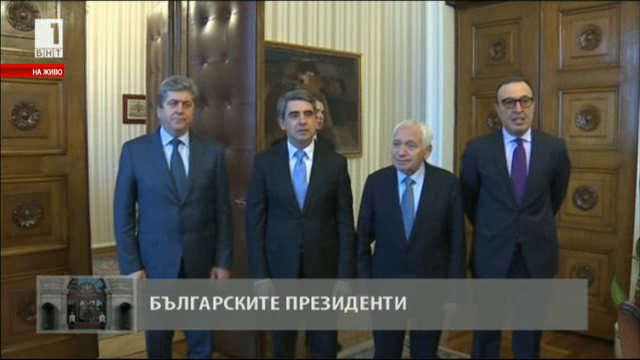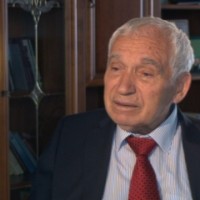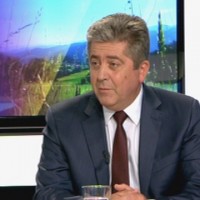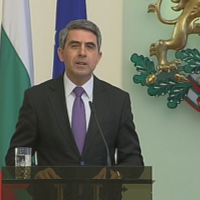General Roumen Radev will be Bulgaria's fifth President. The Presidential institution in Bulgaria is relatively young. It was established after the democratic changes in the country and the Head of State was given the role of a unifier of the...

General Roumen Radev will be Bulgaria's fifth President.
The Presidential institution in Bulgaria is relatively young. It was established after the democratic changes in the country and the Head of State was given the role of a unifier of the nation. Four Bulgarian Presidents occupied this high office in the state over the past quarter of a century.
 The first President of the Republic was Zhelyu Zhelev (in office, 1st of August 1990 – 22nd of January 1992, 22nd of January 1992 – 22nd of January 1997).
The first President of the Republic was Zhelyu Zhelev (in office, 1st of August 1990 – 22nd of January 1992, 22nd of January 1992 – 22nd of January 1997).
On 1st of August 1990, the Seventh Grand National Assembly elected him as President of the country. He held this position until his election as President of the Republic of Bulgaria in the month of January 1992.
The first direct democratic presidential elections were held in two rounds, on 12th of January 1992 and 19th of January 1992. They were won by the candidates of the Union of Democratic Force (UDF), Zhelyu Zhelev, elected President and Blaga Dimitrova, elected Vice-President.
They took the oath in the National Assembly on 22nd of January 1992.
Zhelyu Zhelev - President of Bulgaria: "I will be guided solely by the interests of the Bulgarian people and the Bulgarian State, by the drive to turn Bulgaria into a modern, democratic and prosperous country.”
The new Constitution of July 1991 defined the role and place of the presidential institution. Zhelyu Zhelev was re-elected already by the people for a second term. In January 1992, along with Blaga Dimitrova as Vice-President, they took the oath of office, but later their paths parted. Zhelev’s main objective was for Bulgaria to make its way peacefully from totalitarianism to democracy.
Well accepted in the East and West, he was the only head of state who managed to talk to Boris Yeltsin during the Soviet coup d'état attempt in August 1991.
At his initiative Bulgaria became the first country to recognize Macedonia's independence.
The President is expected to be a corrective to the legislature and the executive. Following this responsibility, all Bulgarian Presidents so far experienced friendly fire. In the summer of 1992 Zhelyu Zhelev sharply criticized the government of Philip Dimitrov, leading to a deterioration of his relations with the Union of the Democratic Forces.
Before the presidential elections in 1996, the United Democratic Forces organized internal elections to determine their candidate for the Presidents’ Office. Zhelyu Zhelev did not win in the next Presidential elections.
 Petar Stoyanov became the Head of State in a very dramatic moment. The country was in a grip of a severe economic and political crisis, the Socialist government led by PM Zhan Videnov resigned after incessant protests.
Petar Stoyanov became the Head of State in a very dramatic moment. The country was in a grip of a severe economic and political crisis, the Socialist government led by PM Zhan Videnov resigned after incessant protests.
On 4th of February, 1997, President Stoyanov convened the Consultative Council for National Security. After dramatic negotiations, the representatives of the Bulgarian Socialist Party Georgi Parvanov and Nikolay Dobrev, returned the mandate to form a government. The country faced early parliamentary elections.
Petar Stoyanov appointed the caretaker cabinet of Stefan Sofiyanski.
Negotiations began with the IMF for the introduction of currency board to stop hyperinflation and stabilize the financial system of the country. In 2001, Stoyanov saw weaknesses in the governance of the cabinet led by the then PM Ivan Kostov. Stoyanov publicly expressed his concerns and tension followed.
In 1999, for the first time in the history of Bulgaria, an American President arrived on a visit. the US President Bill Clinton and Bulgaria's Petar Stoyanov addressed the people gathered in front of "Alexander Nevski" Cathedral in Sofia.
During his term of office, Petar Stoyanov held many meetings with important world figures, some of the meetings were more informal. Petar Stoyanov run for a second presidential term, but unexpectedly to many, he lost to the then BSP leader Georgi Parvanov.
 Georgi Parvanov was the only Bulgarian head of state elected twice in two consecutive terms of office. He had the chance to spend 10 relatively calm years in the Presidency. He assumed office with the promise to be the socially dedicated president.
Georgi Parvanov was the only Bulgarian head of state elected twice in two consecutive terms of office. He had the chance to spend 10 relatively calm years in the Presidency. He assumed office with the promise to be the socially dedicated president.
In his term, the country managed to achieve two important goals - membership in NATO and the EU – goals towards which his predecessors Zhelev and Stoyanov actively worked. On 18th of March 2004, the National Assembly ratified the protocol for joining the North Atlantic Treaty.
Georgi Parvanov - President of Bulgaria: "This is undoubtedly a turning point in the history of Bulgaria. Our country will achieve geostrategic weight to which it has strived for years. We will get reliable, internationally binding legal guarantees for our national security."
On 25th of April, at a ceremony in Luxembourg, the then President Georgi Parvanov and the then Prime Minister Simeon Saxe-Cobourg signed the Treaty of Accession to the European Union. Since 1st of January, 2007, Bulgaria has been is a full member of the European Union.
Georgi Parvanov said: "This is a day of historical justice because Bulgarians have always been Europeans in spirit and identity".
Energy topic was high on his agenda. Parvanov and the Russian President Vladimir Putin signed energy agreements for building "Belene" NPP, Burgas – Alexandroupolis oil pipeline, "South Stream" gas pipeline. Parvanov said at the time that those projects will diversify the energy sources in Europe and will bring economic and social benefits.
Although the three projects were later stopped, at that time Parvanov saw the agreements as a positive step in the development of he Bulgarian-Russian relations. Georgi Parvanov had taken as a personal goal to find a solution for the case with the trial against the 5 Bulgarian nurses and a Palestinian doctor in Libya. In 2007, with the help of Western countries, an agreement was reached for their return to Bulgaria.
Georgi Parvanov welcomed Pope John Paul II in Bulgaria, After their meeting, the Holy Father said he never believed in the Bulgarian connection in the assassination attempt against him.
The name of Georgi Parvanov is associated with the triple coalition, because after the first two largest political parties failed to form a government, he handed the mandate to the Movement for Rights and Freedoms (MRF) and thus a coalition government was formed between the National Movement for Stability and Progress (NMSP), BSP and MRF.
In mid-200, tension was felt in his relations with the then prime minister and Parvanov’s successor as BSP leader, Sergey Stanishev. Parvanov expressed disagreement that several advisors to PM Sergey Stanishev had been appointed in management boards of state-owned companies.
 The term of office of outgoing President Rosen Plevneliev were filled with many challenges - various crises in the country and Europe. He assumed office with the promise to be a pragmatic president. He opened the doors of the Office of the President in 2 blvd Dondukov for the people. He worked with three parliaments and five governments, two of them appointed by him. In February 2013, as a result of mass protests against power monopolies, the government of Prime Minister Boyko Borisov resigned.
The term of office of outgoing President Rosen Plevneliev were filled with many challenges - various crises in the country and Europe. He assumed office with the promise to be a pragmatic president. He opened the doors of the Office of the President in 2 blvd Dondukov for the people. He worked with three parliaments and five governments, two of them appointed by him. In February 2013, as a result of mass protests against power monopolies, the government of Prime Minister Boyko Borisov resigned.
The President appointed a caretaker government and Marin Raykov as the caretaker Prime Minister. It introduction new rules on the management of public funds, thanks to which the state had saved nearly one billion BGN after the bankruptcy of CorpBank. Later, when controversial media magnate Delyan Peevski was selected by the National Assembly to be appointed as the Head of Bulgaria’s State Agency for National Security (SANS), Rosen Plevneliev reacted sharply and urged lawmakers to reconsider their decision and said that the government of the then PM Plamen Oresharski lost credibility.
Following the mass public protests and the fall of cabinet Oresharski, he soon had to appoint a second caretaker government, headed by Prof. Georgi Bliznashki.
Rosen Plevneliev Initiated a referendum on electoral legislation. But the three questions Parliament admitted to the national refendum were only the ones concerning electronic voting. Rosen Plevneliev participated in numerous international forums, held many meetings with world leaders. His criticism towards the policy of Vladimir Putin was atopic on which Plevneliev collided position with Prime Minister Boyko Borisov. Their views on NATO presence in the Black Sea also seriously disagree. Plevneliev was sharply critical over the annexation of Crimea.
As President, Plevneliev repeatedly called for the disclosure of the whole truth about the totalitarian regime in the country.
Over the years, the Presidents of Bulgaria showed that a good initiative can be continued. The initiative for graduation ball for orphans which was launched by President Petar Stoyanov, never stopped over the years. It was further developed by the team of President Plevneliev with the initiative “Support a Dream", which provided scholarships for children from orphanages who wanted to continue their education. The campaign "Bulgarian Christmas", which was launched by President Georgi Parvanov also continueed its life, as well as the initiative, named after John Atanasov, for awards for young scholars.
These are the Presidents of Bulgaria - Zhelyu Zhelev: Petar Stoyanov; Georgi Parvanov and Rosen Plevneliev. Each had their strengths and difficult moments. Each of them left something of themselves in the institution and contributed to its strengthening in the Bulgarian political life.
The fifth Bulgarian President also faces great expectations.